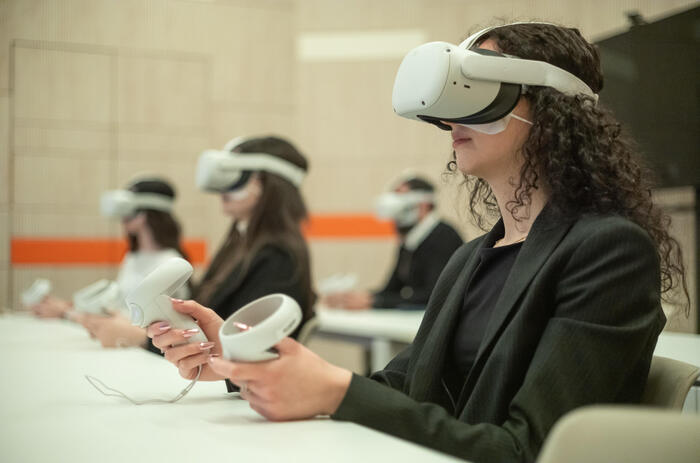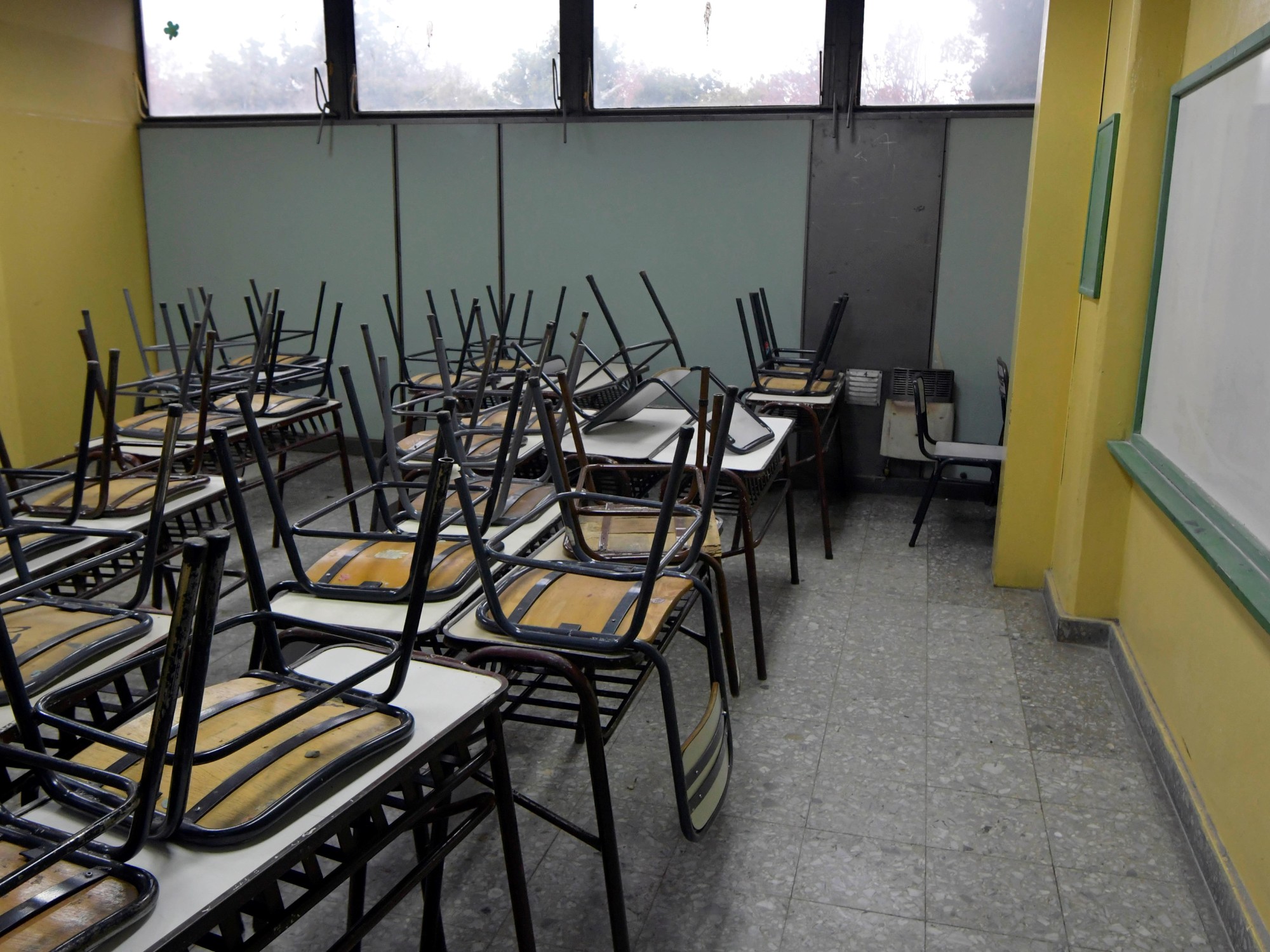Enlarge image
Almost empty lecture halls - that should no longer exist at the University of Leipzig for the rest of the winter semester
Photo: Waltraud Grubitzsch / picture alliance / dpa / dpa-Zentralbild
SPIEGEL:
The winter semester was actually supposed to take place in attendance, but then the number of infections shot up.
For this reason, the University of Leipzig returned to online teaching at the beginning of December - temporarily, because from today lecture halls and seminar rooms are open again.
Why did you choose now, at a new high point in the pandemic?
Hofsäss:
We can see how much students depend on on-site teaching.
Not only for imparting knowledge, it is also about social contact, a clear daily structure and the quality of the exchange.
So many studies now show that learning from home leads to crises and loneliness.
The German Student Union has just reported that its offers for psychosocial counseling are literally being overrun.
SPIEGEL:
But is it really the right time to solve these problems?
The winter semester will be over soon.
In view of the omicron wave, one could ask: the students have held out for so long, can't they make it for a few more weeks now?
Hofsäss:
The term "perseverance" already says it all: this is not how an academic personality can develop.
At best, the students manage to complete the compulsory program.
That's why we had to weigh up - the best possible teaching and at least a little student life against the risk of infection.
Unfortunately, it has to be said today that the coronavirus is part of everyday life.
We cannot isolate ourselves completely.
Enlarge image
Vice-Rector Thomas Hofsäss: "It is an open offer"
Photo: Swen Reichhold / Swen Reichhold / Leipzig University
SPIEGEL:
What about the students who still prefer to isolate themselves at the moment?
Hofsäss:
For us, face-to-face teaching doesn't mean that students are forced onto campus.
It's an open offer.
We didn't want to draw a line and make the decision from above, because then there are always people who feel left out.
But only those who really dare to come should come.
At the beginning of the winter semester that was around 70 percent of the students.
SPIEGEL:
The pandemic situation today is different from what it was at the beginning of the semester.
Hofsäss:
Omikron spreads faster than Delta, that's true.
But we know that vaccination still protects against serious disease, especially young people.
Of course, if the number of infections is high, it can happen that a large number of students are in quarantine.
That is why we have recommended to our teachers that there must be a supplementary digital offer for each classroom event, especially with regard to the upcoming exam preparation.
more on the subject
Fourth corona wave at Germany's universities: forgotten in front of the screen by Armin Himmelrath, Katharina Hölter, Miriam Olbrisch and Sophia Schirmer
Universities in the pandemic: How Corona produces a new generation of studentsBy Marie-Charlotte Maas
The beginning of the semester in attendance at the University of Hamburg: Where is everyone? By Simon Schröder
SPIEGEL:
What is your protection concept for face-to-face teaching given the current high number of infections?
Hofsäss:
That is unchanged.
With us, like at most universities, 3G applies.
Teachers have the opportunity to check this in their seminars and lectures either randomly or completely.
Support is also available for lectures with more than a hundred participants.
But we don't do it like some other universities that hand out ribbons every day or check all students at the entrance.
SPIEGEL:
Why not?
Hofsäss:
Because we haven't had the experience that this is necessary.
In the course of the semester so far, we have had absolutely no problems with someone not adhering to our strict protection and hygiene concept.
The university is a protected space - because of the rules, but also because many young people here behave responsibly and avoid dangers.
We can trust our students.
And that's why we dare to continue the classroom teaching.
SPIEGEL:
Isn't it very risky to rely on that?
Hofsäss:
In spite of face-to-face teaching, there were no super-spreading events at universities until mid-December, so the Unfallkasse Sachsen reported it to us.
We only heard of very limited numbers of infections from employees and students during the attendance phases.
As a university, we feel like an extremely safe place.
SPIEGEL:
Lecturers in particular apparently see things differently.
One called your decision on Twitter "irresponsible", another called it "unbelievable".
What options are there for those who do not want to teach face-to-face?
Hofsäss:
We made sure that you negotiate a solution together with your students.
A seminar, regardless of the form, must be borne by all participants.
I think it's important to exchange arguments about the appropriate form of teaching, because many have great concerns about Omikron.
A hybrid format, for example, suits everyone: those who want to stay at home and those for whom the university is important as a place of learning.
SPIEGEL:
Even with a hybrid format, the teachers have to be on site.
How does this fit together with Federal Labor Minister Hubertus Heil's demand for as much home office as possible?
Hofsäss:
I don't see any contradiction because a face-to-face event is very limited in time.
Our lecturers usually spend a maximum of 20 hours a week in seminars.
This also applies to the students.
In contrast to school or work, face-to-face teaching does not mean that you are there every day from morning to evening.
SPIEGEL:
What do you expect for the remaining semester?
How many students will actually be there?
Hofsäss:
I assume that instead of the estimated 70 percent from the beginning of the winter semester, 50 percent of the students will be there.
Many will certainly choose digital or hybrid teaching.
But many will also be grateful and happy to see the inside of the lecture halls and seminar rooms again.
SPIEGEL:
In which developments in the next few weeks would you reverse classroom teaching?
Hofsäss:
Only if a new corona protection ordinance would require it.
At the beginning of the pandemic, we were preventive and were very careful with presence.
Now we have chosen a different path because we now know a lot more - and our hygiene concept and the vaccination rate among our students make it possible.
We want to get the most out of our teaching and no longer limit ourselves to a minimum.







/cloudfront-eu-central-1.images.arcpublishing.com/prisa/MDIOKAISMOMPFW6N7JYHFUNE4M.jpg)






